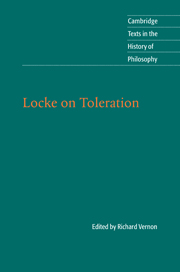Book contents
- Frontmatter
- Contents
- Acknowledgements
- Introduction
- Chronology
- Further reading
- Note on the texts and translation
- Locke on Toleration
- Locke: A Letter concerning Toleration
- Locke: From the Second Treatise (in Two Treatises of Government, 2nd edn, 1698)
- Locke: From An Essay concerning Human Understanding (4th edn, 1700)
- Proast: The Argument of the Letter concerning Toleration, Briefly Considered and Answered (1690)
- Locke: From A Second Letter concerning Toleration (1690)
- Proast: From A Third Letter concerning Toleration in Defence of the Argument of the Letter concerning Toleration, Briefly Considered and Answered (1691)
- Locke: From A Third Letter for Toleration (1692)
- Proast: From A Second Letter to the Author of the Three Letters for Toleration (1704)
- Locke: From A Fourth Letter for Toleration (1704)
- Index
- Titles in the series
Proast: The Argument of the Letter concerning Toleration, Briefly Considered and Answered (1690)
Published online by Cambridge University Press: 05 June 2012
- Frontmatter
- Contents
- Acknowledgements
- Introduction
- Chronology
- Further reading
- Note on the texts and translation
- Locke on Toleration
- Locke: A Letter concerning Toleration
- Locke: From the Second Treatise (in Two Treatises of Government, 2nd edn, 1698)
- Locke: From An Essay concerning Human Understanding (4th edn, 1700)
- Proast: The Argument of the Letter concerning Toleration, Briefly Considered and Answered (1690)
- Locke: From A Second Letter concerning Toleration (1690)
- Proast: From A Third Letter concerning Toleration in Defence of the Argument of the Letter concerning Toleration, Briefly Considered and Answered (1691)
- Locke: From A Third Letter for Toleration (1692)
- Proast: From A Second Letter to the Author of the Three Letters for Toleration (1704)
- Locke: From A Fourth Letter for Toleration (1704)
- Index
- Titles in the series
Summary
In the beginning of this letter, the author speaks of the ‘mutual toleration of Christians in their different professions of religion’. But toward the end of it he says: ‘if we may openly speak the truth, and as becomes one man to another, neither pagan, nor Muslim, nor Jew ought to be excluded from the civil rights of the commonwealth, because of his religion’. And all that he requires of any, to qualify them for the benefit of the toleration he endeavours to promote, is only that they not be atheists; that they hold no opinions contrary to civil society; and that they own and teach the duty of tolerating all men in matters of mere religion.
So that the design of the author is evidently to show that all the religions and sects in the world that are but consistent with civil society, and ready to tolerate each other, ought everywhere to be equally tolerated and protected, or to enjoy an equal and impartial liberty, as the preface calls it.
I do not believe this author intends any prejudice, either to religion in general or to the Christian religion. But yet it seems hard to conceive how he should think to do any service to either, by recommending and persuading such a toleration as he here proposes. For how much soever it may tend to the advancement of trade and commerce (which some seem to place above all other considerations) I see no reason, from any experiment that has been made, to expect that true religion would be any way a gainer by it; that it would be either the better preserved, or the more widely propagated, or rendered any whit the more fruitful in the lives of its professors by it.
- Type
- Chapter
- Information
- Locke on Toleration , pp. 54 - 66Publisher: Cambridge University PressPrint publication year: 2010
- 2
- Cited by



